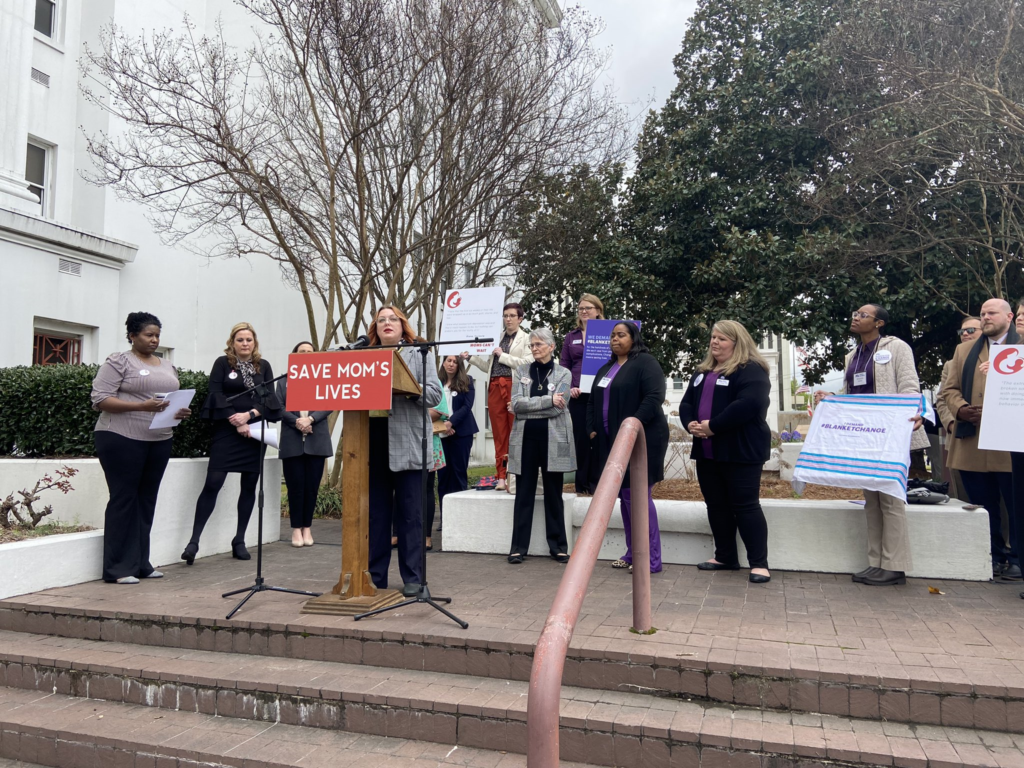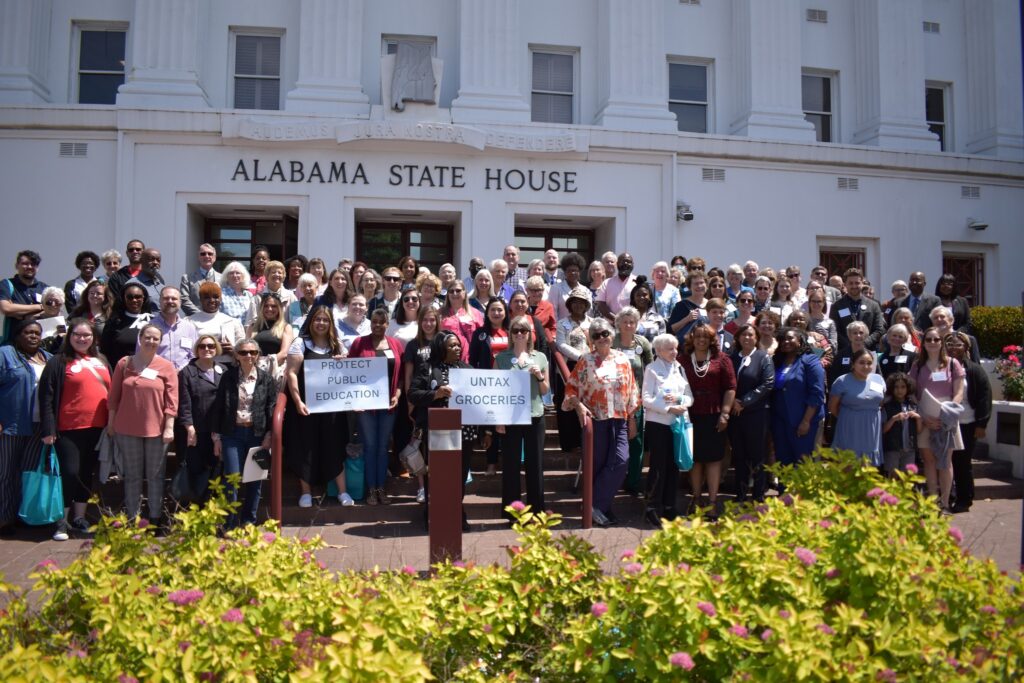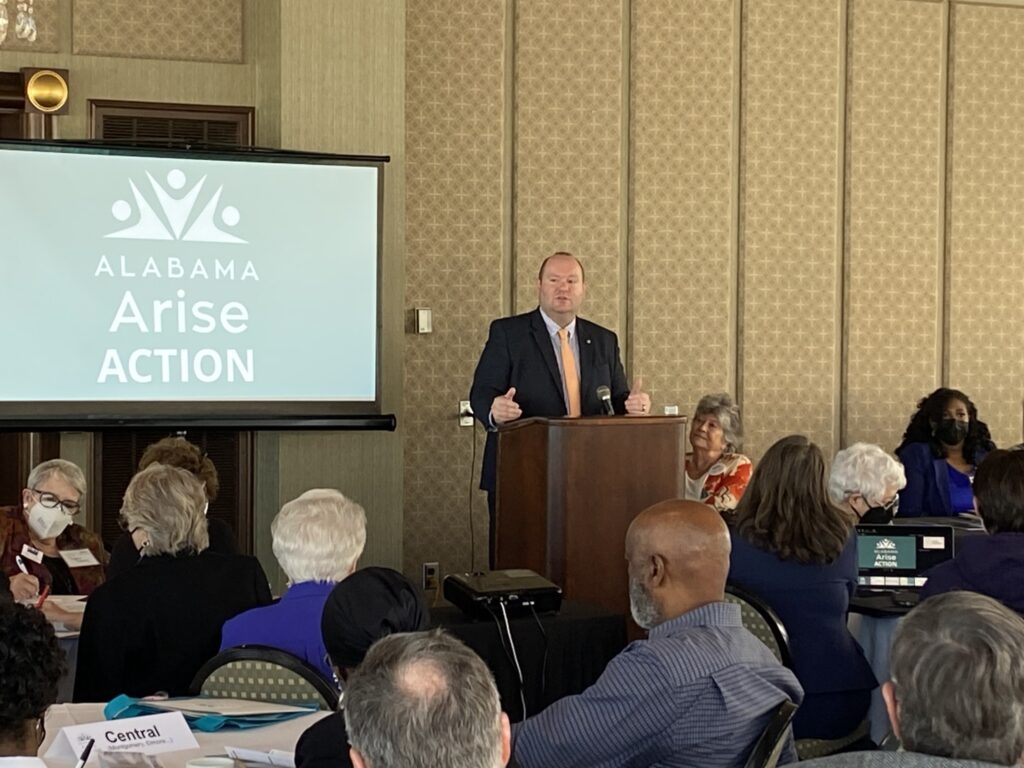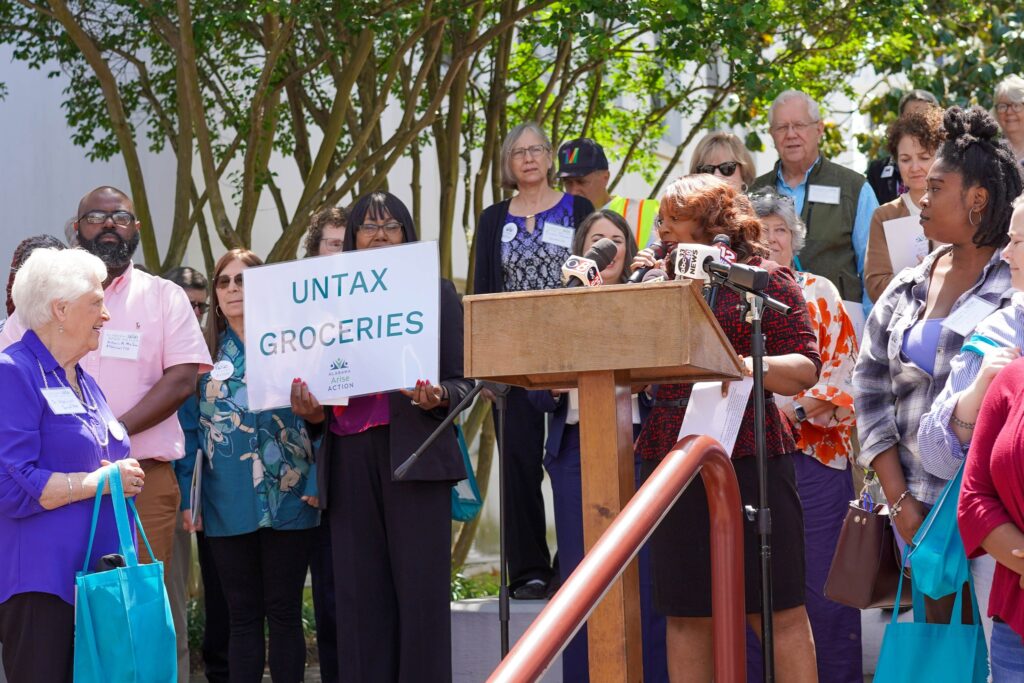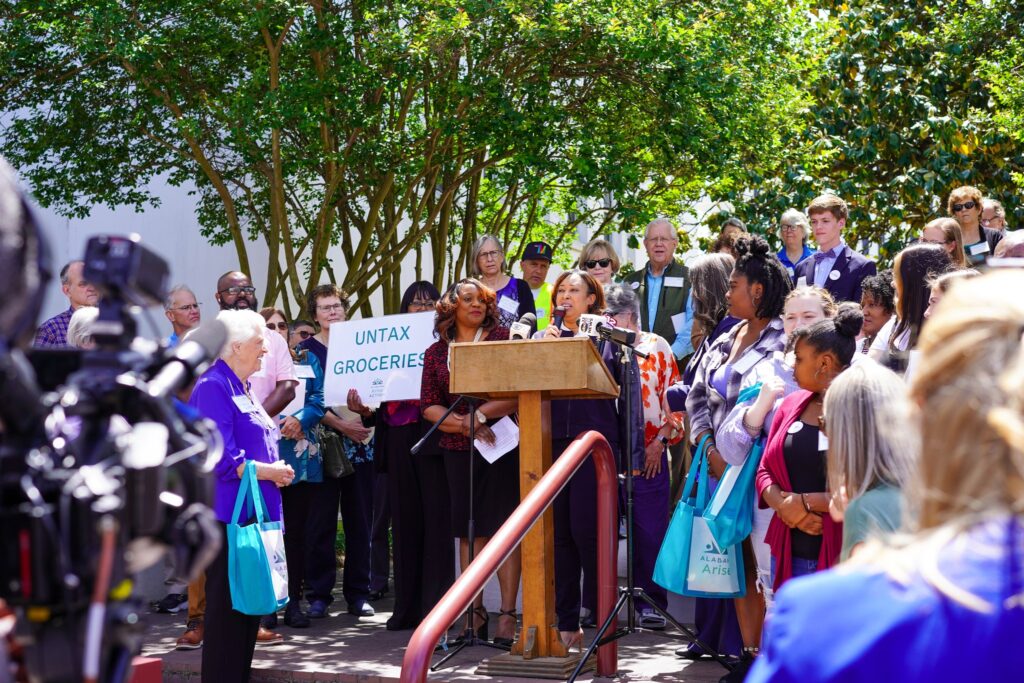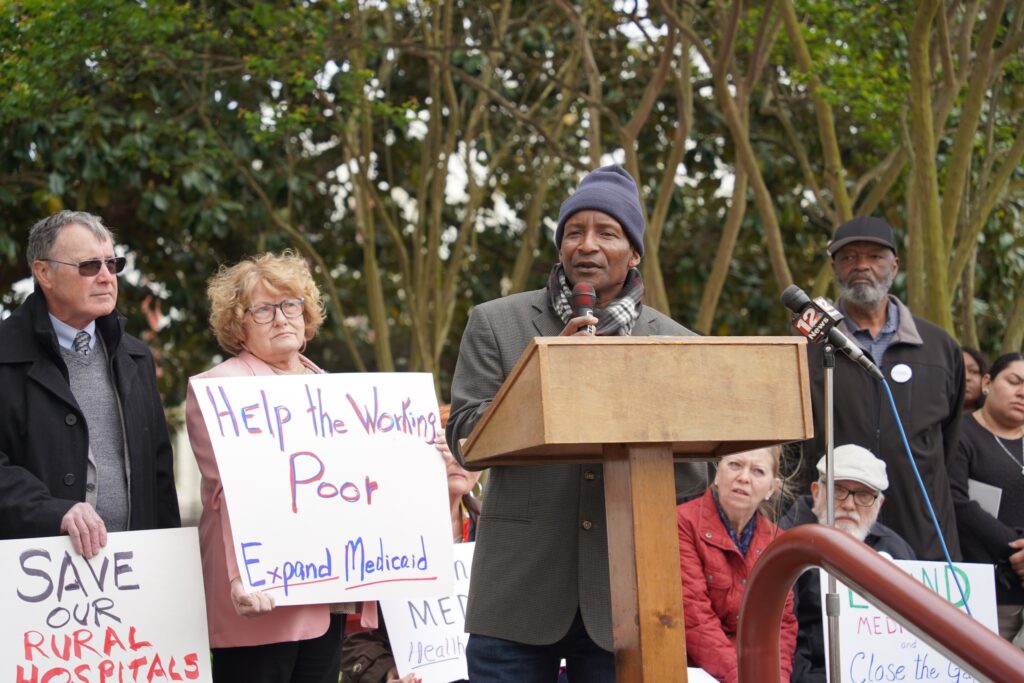Expanding Medicaid and ending the state sales tax on groceries will remain top goals on Alabama Arise’s 2024 legislative agenda. The group also will pursue a multifaceted approach to improving maternal and infant health in Alabama.
More than 500 members voted to determine Arise’s legislative priorities in recent days after the organization’s annual meeting Saturday. The seven priorities chosen were:
- Adequate budgets for human services, including expanding Medicaid to make health coverage affordable for all Alabamians and protecting public education funding for all students.
- Tax reform to build a more just and sustainable revenue system, including eliminating the rest of Alabama’s state sales tax on groceries and replacing the revenue equitably.
- Voting rights, including no-excuse early voting, removal of barriers to voting rights restoration for disenfranchised Alabamians, and other policies to protect and expand multiracial democracy.
- Criminal justice reform, including legislation to reform punitive sentencing laws and efforts to reduce overreliance on exorbitant fines and fees as a revenue source.
- Comprehensive maternal and infant health care investments to ensure the health and safety of Alabama families.
- Dedicated funding for public transportation to empower Alabamians with low incomes to stay connected to work, school, health care and their communities.
- Death penalty reform, including a law to require juries to be unanimous in any decision to impose a death sentence.
“Arise believes in dignity, equity and justice for everyone,” Alabama Arise executive director Robyn Hyden said. “Our 2024 legislative priorities reflect our members’ embrace of those values, and they underscore the need to enact policies that empower Alabamians of every race, income and background to reach their full potential. Together, we’re working to build a healthier, more just and more inclusive Alabama for all.”
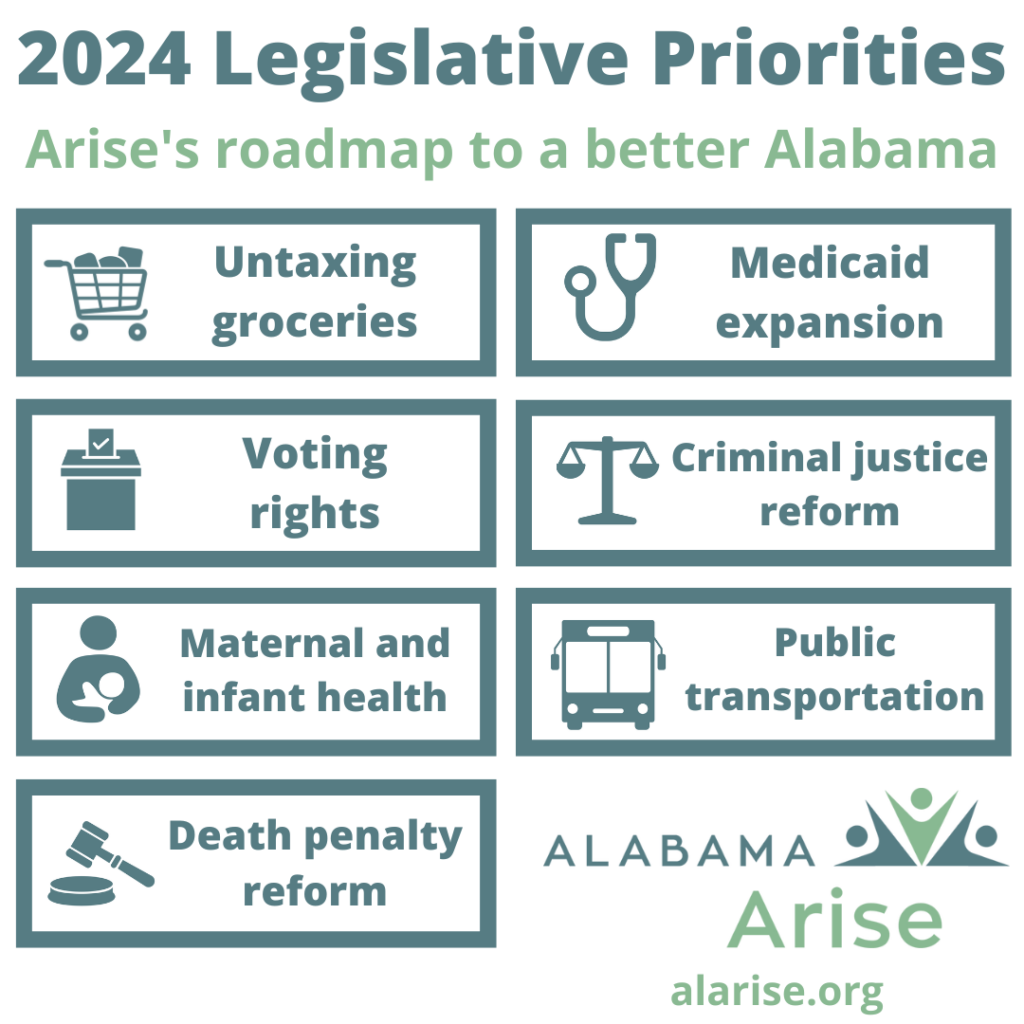
The time is right to close Alabama’s health coverage gap
One essential step toward a healthier future for Alabama is to ensure everyone can afford the health care they need. Arise members believe Medicaid expansion is a policy path to that destination, and research provides strong support for that position.
Expanding Medicaid to cover adults with low incomes would reduce racial health disparities and remove financial barriers to health care for nearly 300,000 Alabamians. It would support thousands of new jobs across the state. And most importantly, it would save hundreds of lives every year.
“Medicaid expansion would boost our economy and improve the lives of hundreds of thousands of Alabamians,” Hyden said. “It’s time for Alabama’s policymakers to make this life-saving and job-creating investment in the people of our state. Ensuring Alabamians’ health and well-being now will help our state flourish for decades to come.”
Alabama became one of only 10 states yet to expand Medicaid after North Carolina enacted expansion in March. Medicaid expansion would ensure health coverage for nearly 300,000 Alabamians caught in the coverage gap. Most of these residents earn too much to qualify for the state’s bare-bones Medicaid program but too little to afford private plans.
How Medicaid expansion would improve maternal and infant health
Medicaid expansion also would bolster health care access for Alabamians before, during and after pregnancies. This would be a critical life-saving move in Alabama, which has the nation’s worst maternal mortality rate. Those rates are even higher for Black women, who are twice as likely to die during birth as white women. Adding to the problem, more than two-thirds of Alabama counties offer little or no maternity care or obstetrical services.
“Alabama took an important step to help families stay healthy by extending Medicaid postpartum coverage last year,” Hyden said. “However, that step alone was not enough to meet our state’s numerous health care needs. Policymakers should pursue numerous solutions to make Alabama a better place for parents and babies. At the top of that list should be expanding Medicaid to ensure Alabamians of all ages can stay healthy before, during and after conception.”
New to Arise’s agenda this year is a comprehensive policy approach to safeguarding and expanding access to maternal and infant health care in Alabama. In addition to Medicaid expansion, this approach would promote seamless continuity of care between home and clinical settings. It would include coverage for contraception and midwifery services. And it would eliminate the specter of criminal penalties for doctors who provide care to pregnant people who are experiencing life-threatening complications.
Finish the job: Alabama should remove the rest of the state grocery tax
Arise advocacy got results this year when legislators voted unanimously to reduce Alabama’s state sales tax on groceries by half. The new law reduced the state grocery tax from 4 cents to 3 cents on Sept. 1. Another 1-cent reduction will occur in 2024 or the first subsequent year when education revenues grow by at least 3.5%.
Arise’s members have advocated for decades to untax groceries, and they renewed their commitment to continue that work in 2024. Ending the state grocery tax remains a core Arise priority because the tax makes it harder for people with low incomes to make ends meet. The tax adds hundreds of dollars a year to the cost of a basic necessity for families. And most states have abandoned it: Alabama is one of only 12 states that still tax groceries.
The state grocery tax brought in roughly 7% of the Education Trust Fund’s revenue in the last budget year. But lawmakers have options to remove the other half of the state grocery tax while protecting funding for public schools. Arise will continue to support legislation to untax groceries and replace the revenue by capping or eliminating the state income tax deduction for federal income taxes. This deduction is a tax break that overwhelmingly benefits the richest households.
“Reducing the state grocery tax was an important step toward righting the wrongs of Alabama’s upside-down tax system,” Hyden said. “By untaxing groceries and reining in the federal income tax deduction, lawmakers can do even more to empower families to keep food on the table. Closing this skewed loophole is an opportunity to protect funding for our children’s public schools and ensure Alabama can afford to end the state grocery tax forever.”

